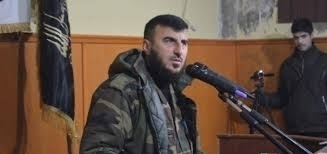In Brief
Zahran Alloush is a military commander of the Islamic Front, which was formed by the merger of several Islamist factions including the Islamic Army. He believes that only armed struggle will force the Syrian regime to abandon power; therefore, he established the Battalion of Islam, which expanded to become the Brigade of Islam and then the Islamic Army. The group conquered most of the Eastern Ghouta near Damascus. Zahran is also known as “Sheikh Zahran” for his Islamist credentials. As one of the most influential figures in Syria, he is a product of the ongoing civil war: a warlord.
Background
Zahran’s full name is Mohammed Zahran Abdullah Alloush. He was born in 1971 in Douma, a city near Damascus and his current stronghold. Zahran has three wives and 10 children. His father Abdullah Alloush was a major advocate of the Salafist movement in Douma, and Zahran followed his fathers’ footsteps into the movement as well.
Zahran studied Islamic jurisprudence (sharia) at Damascus University and later completed his Islamic education in Saudi Arabia under the auspices of senior sheikhs. Afterwards, he returned to Syria to earn a master’s degree in sharia from Damascus University while working as a contractor. He was affiliated with the Salafist Dawa group, and was arrested in 2009 for his alleged Islamist activities and possession of a weapon in his car. Until June 2011, a few months after the beginning of the Syrian revolution, he stayed in jail; he was then released as part of a presidential amnesty that, as some suspect, intended to allow Islamists to establish armed groups to justify the regime’s severe suppression of ensuing demonstrations.
A Master of Tactical Withdrawal
Many call Zahran a master of tactical withdrawal. However, he has been accused of justifying his defeats in several areas where he fought against the Syrian regime as tactical withdrawals. Some have also accused Zahran of neglecting areas outside Douma and its environs because they are not considered as part of his Islamic emirate. Zahran’s popularity has already crashed among Sunnis in Damascus – who had discreetly supported him – when he bombed the city with rockets and missiles in retaliation for the regime’s bombing of his territory. Zahran’s opponents also call him a dictator who ordered the assassination of competing political leaders to monopolize power.
At the same time, Zahran and ISIS are deeply hostile to each other only because their interests and spheres of influence have clashed. In fact, Zahran did not reveal his fangs before his forces and ISIS clashed inside his territory in Ghouta when ISIS warriors killed one of the leaders of Zahran’s forces.
Relationship with Syrian National Coalition and Disappearance of Civil Activists
Zahran has a stormy relationship with the Free Syrian Army. He also repeatedly declared on his Facebook page that he rejects any secular leadership imposed from outside, hinting at the Syrian National Coalition. The disappearance of activist Razan Zeitouneh and her colleagues, who were abducted in Douma under his control, is another black spot in Zahran’s history. Despite his repeated denial of any involvement in this incident, all evidences point to his ultimate responsibility.
Zahran has also faced opposition from within Douma, where thousands of demonstrators took to the streets to protest against his oppression and corruption; a prominent example was a scandal that involved his own food warehouse while the people of Eastern Ghouta were suffering from severe famine caused by inhumane blockade imposed by the regime forces.
Zahran is reportedly supported by Saudi Arabia, which hosts his father until this day. However, he succeeded in reaching a significant rapprochement with Turkey during his visit to the country a few months ago. Turkey was initially suspicious of the maneuvers of the Islamic Army, especially those in the border regions of Bab al-Hawa; Zahran’s visit raised my questions regarding how he achieved this rapprochement, but he did manage to produce some results.
Nevertheless, many fear that Zahran may overreact to the recent bombing of Douma by the regime forces, which massacred civilians in the city.


